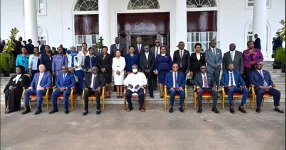President Museveni wants courts to use African methods for solving problems. He called for this change at a ceremony where 21 new judges took their oaths at State House in Entebbe. The President believes local communities should handle minor conflicts like stolen property or family issues. He thinks the current system costs people much more than needed.
Museveni suggested changing the name "Alternative Dispute Resolution" to "Original Dispute Resolution." He explained that Africans have solved conflicts their way for centuries. The President described how Banyankole tradition dealt with unhappy marriages – the woman returned to her parents, both families talked things out, and whoever did wrong paid something to make up for it.
The President told a Bible story about King Solomon to show how simple problem-solving works better. When two women claimed one baby, Solomon offered to cut the child in half. The real mother begged to give the baby away rather than harm it. Solomon knew right away she was the true mother. "That was fast, fair, and effective," Museveni said.
The President wants three main things from courts: peace in communities, fairness to victims, and awareness of what the country can afford. He complained about thieves who steal pigs and chickens from government programs yet walk free on bail. These actions make people lose faith in the courts. "Justice should ensure calmness in the country. No one should feel angry because they failed to get justice," he said.
Museveni talked about money problems facing the courts. Uganda collects just 13% of its wealth as taxes, much less than Poland's 20%. He promised more funding as the economy grew stronger. "The strength of a blow depends on the muscles; the budget depends on the strength of the economy," he explained. He reminded everyone that during war times, soldiers worked for almost nothing because the country had little money.
Chief Justice Alfonse Owiny-Dollo agreed with the President about local methods. He noted that over 90% of disputes worldwide never reach formal courts. "What has stabilized Uganda comes from traditional justice systems," he said. The Chief Justice asked the President for money to expand these local methods. He also praised Museveni for appointing thirty judges at once – something never done before.
Justice Minister Norbert Mao warned the new judges that history would judge them. He urged them to remember each case has special circumstances, especially those affecting national security. "Sometimes enemies of democracy disguise themselves as champions," Mao cautioned. He reminded judges to follow the Constitution and give fair treatment even to unpopular people.
Mao celebrated the new judges' diverse backgrounds, comparing them to different fruits and making a good salad together. The Minister pointed out how Uganda has grown enough to support over 100 High Court judges, 35 appeals court justices, and soon, 15 Supreme Court justices. Other officials and family members of the new judges attended the ceremony at State House.
Museveni suggested changing the name "Alternative Dispute Resolution" to "Original Dispute Resolution." He explained that Africans have solved conflicts their way for centuries. The President described how Banyankole tradition dealt with unhappy marriages – the woman returned to her parents, both families talked things out, and whoever did wrong paid something to make up for it.
The President told a Bible story about King Solomon to show how simple problem-solving works better. When two women claimed one baby, Solomon offered to cut the child in half. The real mother begged to give the baby away rather than harm it. Solomon knew right away she was the true mother. "That was fast, fair, and effective," Museveni said.
The President wants three main things from courts: peace in communities, fairness to victims, and awareness of what the country can afford. He complained about thieves who steal pigs and chickens from government programs yet walk free on bail. These actions make people lose faith in the courts. "Justice should ensure calmness in the country. No one should feel angry because they failed to get justice," he said.
Museveni talked about money problems facing the courts. Uganda collects just 13% of its wealth as taxes, much less than Poland's 20%. He promised more funding as the economy grew stronger. "The strength of a blow depends on the muscles; the budget depends on the strength of the economy," he explained. He reminded everyone that during war times, soldiers worked for almost nothing because the country had little money.
Chief Justice Alfonse Owiny-Dollo agreed with the President about local methods. He noted that over 90% of disputes worldwide never reach formal courts. "What has stabilized Uganda comes from traditional justice systems," he said. The Chief Justice asked the President for money to expand these local methods. He also praised Museveni for appointing thirty judges at once – something never done before.
Justice Minister Norbert Mao warned the new judges that history would judge them. He urged them to remember each case has special circumstances, especially those affecting national security. "Sometimes enemies of democracy disguise themselves as champions," Mao cautioned. He reminded judges to follow the Constitution and give fair treatment even to unpopular people.
Mao celebrated the new judges' diverse backgrounds, comparing them to different fruits and making a good salad together. The Minister pointed out how Uganda has grown enough to support over 100 High Court judges, 35 appeals court justices, and soon, 15 Supreme Court justices. Other officials and family members of the new judges attended the ceremony at State House.












